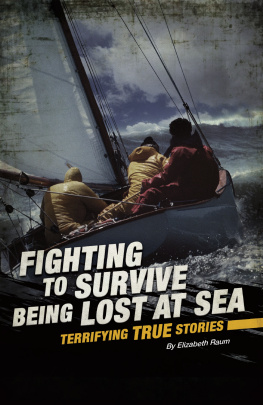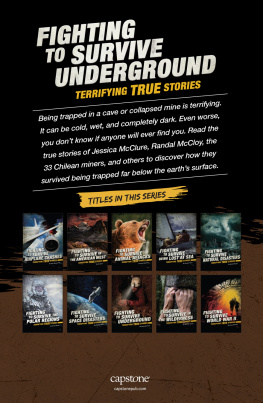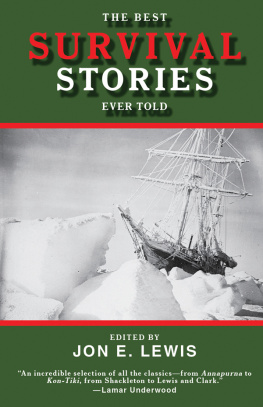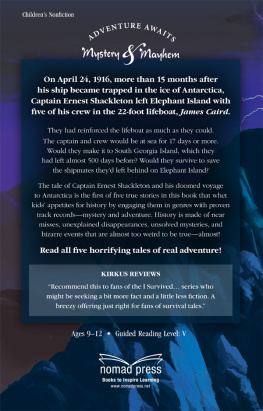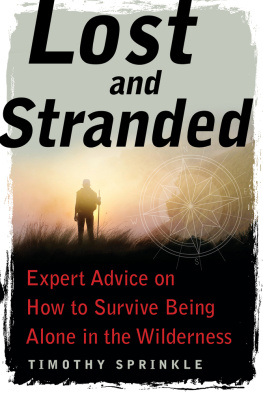
THE Greatest Survival Stories OF All Time
True Tales of People Cheating Death When Trapped in a Cave, Adrift at Sea, Lost in the Forest, Stranded on a Mountaintop, and More
CARA TABACHNICK
Text copyright 2019 Cara Tabachnick. Design and concept copyright 2019 Ulysses Press and its licensors. All rights reserved. Any unauthorized duplication in whole or in part or dissemination of this edition by any means (including but not limited to photocopying, electronic devices, digital versions, and the internet) will be prosecuted to the fullest extent of the law.
Published in the United States by:
Ulysses Press
P.O. Box 3440
Berkeley, CA 94703
www.ulyssespress.com
ISBN: 978-1-61243-922-8
Acquisitions editor: Bridget Thoreson
Managing editor: Claire Chun
Editor: Renee Rutledge
Proofreaders: Lauren Harrison, Barbara Schultz
Front cover design: David Hastings
Cover photo: Davide Foti/Unsplash
IMPORTANT NOTE TO READERS: Although the author and publisher have made every effort to ensure that the information in this book was correct at press time, the author and publisher do not assume and hereby disclaim any liability to any party for any loss, damage, or disruption caused by errors or omissions, whether such errors or omissions result from negligence, accident, or any other cause.
Contents
Introduction
Humans believe we have the ability to surmount great adversity. At least, thats what many people, including me, tell ourselves about how we would react when faced with a traumatic situation that we have no control over. But do we? How would we respond if we were caught in an earthquake or a plane crash, or even something more common, such as getting lost on a hike in the desert? All the markers of life that we hold familiar disappear in an instantand we are left in the maelstrom of uncertainty. In that split second, do we have what it takes to survive?
As I researched and wrote about the following global survival stories, I was overcome by the main characters abilities not only to make difficult decisionssometimes in the face of extreme terrorbut also to thrive in the aftermath. What was it about these survivors that set them apart? Did an exceptional force live within them? Did they always have the ability to achieve superhuman feats? Or were they just ordinary people blessed with extraordinary grit?
In my quest to discover what set these humans apart, I accessed troves of historical documents, including recently de-classified spy records from the United Kingdoms National Archives, a ship captains personal diary retrieved from the Library of Congress, historical newspaper and magazine articles, and a myriad of audio and television interviews to reconstruct these extraordinary stories.
As I reported their experiences, I was struck over and over again by just the simple will to survive. In todays world, we live very orderly lives governed by regulation. Everything, including our food, homes, workplaces, and schools are connected by technology in a way that was unimaginable just a few years ago. In an instant we can get or watch what we want, which has cocooned society in a heterogeneous bubble. There is nothing primal about how we exist in todays day and age.
When we read tales of survival, the stories tap into what it means to be connected to our elemental selves. Every person profiled in this book was no more or less than an ordinary human being. What set them apart was their willand the confidence within themselves to use it. For that is what these survivors have, whether they fell out of a plane, or were lost in the Sahara, or caught spying during the warthey used interior determination to escape the situation. In the end, we are all capable of extraordinary actions. It can just be a matter of how much we believe in ourselves.
This realization was amplified by the audio recordings I listened to during the course of reporting these stories. One was an interview with Juliane Koepcke, the sole survivor of an airplane crash that descended smack in the middle of the Peruvian rain forest. Just a teenager, Juliane was traveling on Christmas Eve with her mother, who died soon after the plane plummeted to the ground. After searching for, but not finding her mother, Juliane managed to survive for almost eleven days in the jungle before she was rescued by two woodcutters. She subsisted mostly on water, foraged leaves, and one bag of holiday candy.
As an adult woman recounting her experience, Juliane remembered how after the crash, she felt an instinctive need to survive. She knew she needed to move forward, and even her fear, and the unknown outcome of her mothers life, didnt stop the march. And she wasnt going to, couldnt, give up. Listening to her story made me realize lifes fragility and the grip humans place on it when we can feel it slipping away. The ability to thrive in the face of great danger blooms inside all of us.
My hope is that the triumphs of the survivors profiled here help readers understand the value of life when faced with its demise and, for a moment, feel the pure joy of living.
Juliane Koepcke
Primal Survivor
Peruvian Rain Forest, 1971
A blinding white light burst off the airplanes fixed wing. The passengers on the flight screamed in horror. Pressure in the main cabin dropped, the tightly packed overhead bins snapped open, and suitcases, books, and presents wrapped in brightly colored Christmas paper fell into the aisles.
The last thing then-17-year-old Juliane Koepcke heard her beloved mother Maria say was, This is it.
This was not what Juliane had imagined when they arrived at the airport earlier that day on December 24, 1971, for the regularly scheduled flight from Lima to Pucallpa, a rural area in the center of Peru. They had planned to spend December through February, Perus summer season, with Julianes father, Hans-Wilhelm, at their biology station in the middle of the rain forest. Noted German ornithologists, Maria and Hans-Wilhelm were experts on Peruvian birds and had spent their whole careers categorizing and studying them. Under their tutelage, Juliane grew up living between Lima, the capital city, and their research stations. She knew both worlds well and loved the benefits of moving between the two. After a demanding school year, she was ready to explore and relax in the fields and jungles where she had spent a large portion of her childhood.
Instead, their planes takeoff had been delayed seven hours. The airport had been chaotic. Several flights had been canceled the day before and the airlines were mobbed with people trying to get out before Christmas. People pushed and shoved each other as they demanded answers from airport representatives. A general sense of desperation coupled with anger pulsed through the crowd. Everyone was eager to spend time with their families. Even though delayed flights were normal in Peru, Juliane felt frustrated. The night before, she had stayed up late to attend her high school graduation dance, and the day before that had been her graduation itself. It had been a whirlwind of events and endless celebrations. She had been tired, but she hadnt wanted to complain to her mother, as it was because Juliane begged to stay longer in Lima to attend her special events theyd decided to fly on Christmas Eve. All right, Maria had acquiesced. Well fly on the 24th.
The future was bright and exciting for the petite teenage girl teetering on the cusp of adulthood. It was to be her final schoolgirl summer holiday; afterward, Juliane planned to leave the jungle and mountain landscapes of Peru behind for university study in Bonn, Germany. She had dressed for the brief flight in her best: a brightly patterned mini-dress that barely covered her knees and showed off her thin, pale legs. Short skirts had become all the rage for 1970s high school students, and Juliane wore the style well. The colors complemented her ashy blond hair, which curled gently around her delicate features.
Next page


